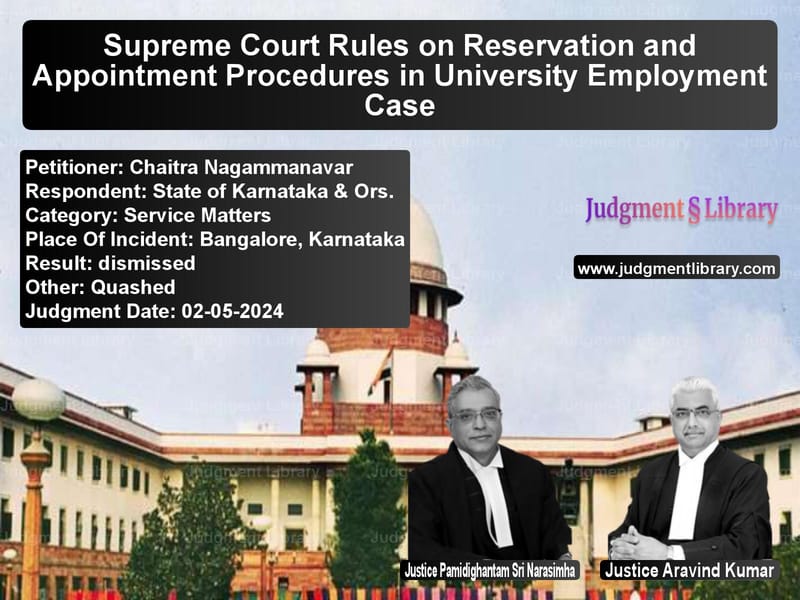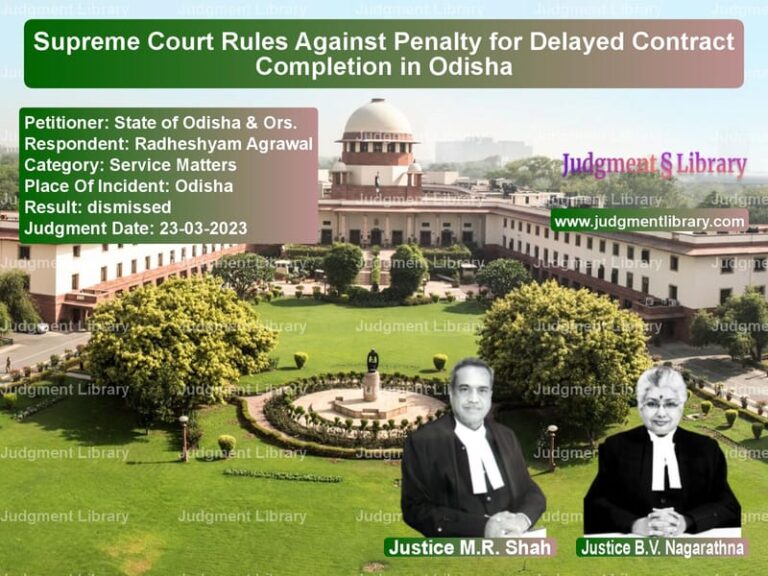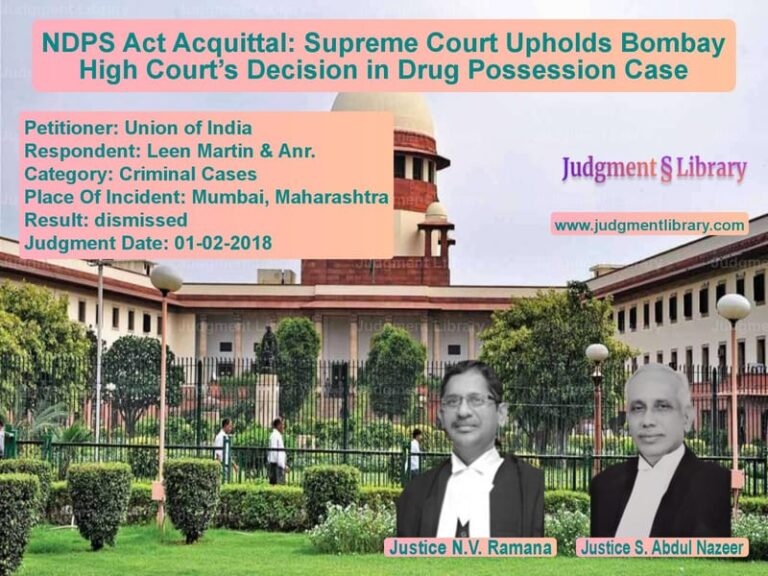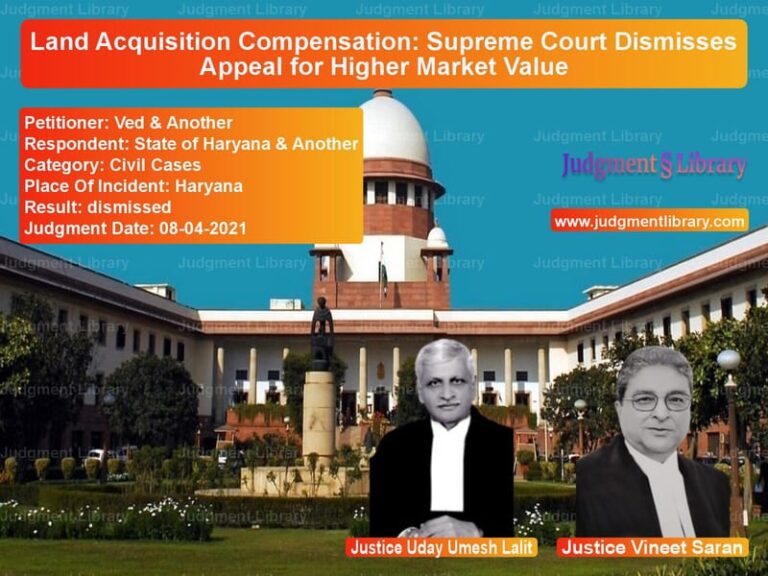Supreme Court Rules on Reservation and Appointment Procedures in University Employment Case
The case of Chaitra Nagammanavar vs. State of Karnataka & Ors. deals with the controversy over the appointment of an Assistant Professor at Bangalore University, specifically concerning the reservation policy and the application of the Karnataka State Civil Services (Special Recruitment) Rules, 2001. The Supreme Court’s judgment provides clarity on the scope of these rules and the applicability of state-level provisions for university appointments, especially regarding the preferential treatment given to certain candidates based on age and qualifications under the reservation policies.
Background of the Case
The dispute arose after an advertisement issued by Bangalore University in March 2018, inviting applications for filling backlog vacancies reserved for scheduled tribes (STs). The advertised vacancy for the Assistant Professor position in the English department was specifically reserved for a candidate from the ST category. Both the appellant, Chaitra Nagammanavar, and respondent No. 7, were eligible candidates from the ST category, but there were differences in their age group, which became the crux of the case.
Chronology of Events
- 2018: Bangalore University published an advertisement for the recruitment of Assistant Professors, including one reserved position for a candidate from the ST community.
- March 2018: The advertisement specified that the selection would follow the Karnataka State Civil Services (Special Recruitment) Rules, 2001, granting preference to candidates within the age bracket of 29-40 years.
- 2018-2020: Both the appellant and respondent No. 7 applied, with the appellant having a higher merit score, while respondent No. 7 fell within the preferential age bracket.
- January 2021: The Single Judge of the Karnataka High Court ruled in favor of respondent No. 7, directing his appointment, as the university had not adhered to the preference criteria specified in the 2001 Rules.
- 2023: The Supreme Court dismissed the appeals filed by the appellant and Bangalore University, agreeing with the High Court’s interpretation of the selection process.
Legal Issues Considered
The Supreme Court examined several key legal issues in this case:
- Whether the university was correct in applying its own merit-based procedure, despite the explicit provisions of the 2001 Rules for reservation and age-based preference.
- The applicability of the Karnataka State Civil Services (Special Recruitment) Rules, 2001, specifically Rule 6, which grants preference to candidates within a certain age group for reserved positions.
- Whether the appointment process was fair and in compliance with the statutory rules governing recruitment for reserved posts.
Arguments by the Appellant (Chaitra Nagammanavar)
The appellant argued that:
- She had a higher merit score than respondent No. 7, which should have been the determining factor for the appointment.
- The university’s reliance on the 2001 Rules was misplaced, as they apply to state civil services, not university appointments.
- The decision to give preference based solely on age, without regard to merit, violated the principles of fairness and equal opportunity.
Arguments by the Respondent (State of Karnataka and Respondent No. 7)
The respondent contended that:
- The university had explicitly advertised the post in accordance with the 2001 Rules, and the preference for candidates within the age bracket of 29-40 years was legally binding.
- Respondent No. 7 was entitled to preferential treatment due to falling within the specified age group, as per the statutory rules.
- The appellant’s merit position did not override the preference given by the 2001 Rules, which were designed to address historical injustices against the ST community.
Supreme Court’s Judgment
The Supreme Court ruled in favor of respondent No. 7, holding that:
“The advertisement issued by the university clearly stated that the selection would be made in accordance with the 2001 Rules. The university’s decision to deviate from this and appoint the appellant based on merit was incorrect. Respondent No. 7, who was within the preferential age bracket, was rightly entitled to the appointment as per the prescribed rules.”
- The Court found that the 2001 Rules were applicable to the case and governed the method of selection.
- The preference given to candidates within the age group of 29-40 years was valid under the 2001 Rules and should have been followed by the university.
- The Court held that the appellant’s merit, though higher, could not override the statutory preference provided to respondent No. 7.
Impact of the Judgment
This ruling has significant implications for the recruitment process in government institutions and universities:
- Clarification on Reservation Policies: The judgment reaffirms the importance of following statutory reservation rules in recruitment for reserved positions.
- Merit vs. Statutory Preference: The Court emphasized that statutory rules concerning reservation and age preferences must be adhered to, even if they conflict with merit-based selection procedures.
- Strengthened Legal Framework for Recruitment: This judgment ensures that institutions must strictly follow the recruitment rules and avoid bypassing statutory provisions for fairness in selection processes.
Conclusion
The Supreme Court’s ruling in Chaitra Nagammanavar vs. State of Karnataka & Ors. serves as a crucial reminder that statutory rules regarding reservation and preferential treatment for specific categories must be followed strictly. In this case, the preference for candidates within a certain age group under the Karnataka State Civil Services Rules was upheld, despite the appellant’s higher merit. The judgment reinforces the importance of fairness and equal opportunity in government recruitment processes.
Petitioner Name: Chaitra Nagammanavar.Respondent Name: State of Karnataka & Ors..Judgment By: Justice Pamidighantam Sri Narasimha, Justice Aravind Kumar.Place Of Incident: Bangalore, Karnataka.Judgment Date: 02-05-2024.
Don’t miss out on the full details! Download the complete judgment in PDF format below and gain valuable insights instantly!
Download Judgment: chaitra-nagammanavar-vs-state-of-karnataka-&-supreme-court-of-india-judgment-dated-02-05-2024.pdf
Directly Download Judgment: Directly download this Judgment
See all petitions in Promotion Cases
See all petitions in Recruitment Policies
See all petitions in Judgment by P.S. Narasimha
See all petitions in Judgment by Aravind Kumar
See all petitions in dismissed
See all petitions in Quashed
See all petitions in supreme court of India judgments May 2024
See all petitions in 2024 judgments
See all posts in Service Matters Category
See all allowed petitions in Service Matters Category
See all Dismissed petitions in Service Matters Category
See all partially allowed petitions in Service Matters Category







